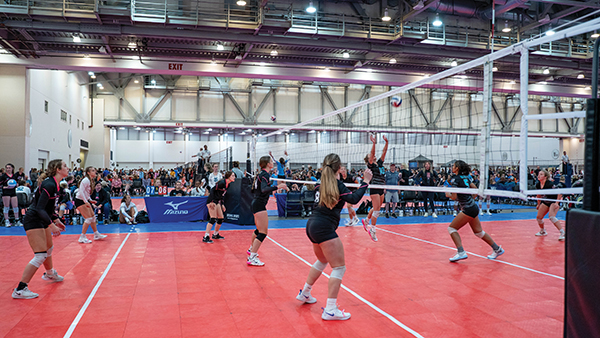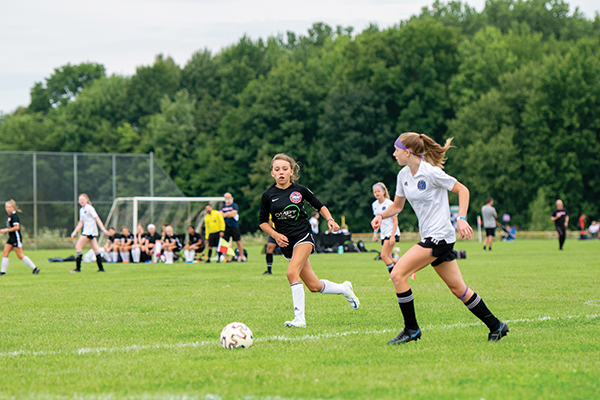
When it comes to booking an event venue, many factors can optimize your success, and your local sports commission, chamber of commerce or convention and visitors bureau can be your partner on the ground to help negotiate this process and make your venue contract as favorable as possible.
Below are considerations to make both before and after selecting the facility to ensure a partnership that benefits all. Flexibility will be the key to success.
1. Work with a Local DMO Partner
Once you’ve identified a city to host your event, your first call should be to the local sports commission or destination marketing organization (DMO) – whether a CVB or chamber – if you aren’t working with one already. While the DMO represents the local destination partners, it has every incentive to make the event a mutual win that hopefully results in a repeat event. The organization knows the local landscape and area partners (venues, lodging, vendors, sports groups, media) and it can help you negotiate based on the metrics of your event.
2. Be Flexible on Dates, Space and Rates

Securing an event venue comes down to dates, space and rates – and you need flexibility on at least one of these items to secure a venue.
Dates – If you’re firm on the timing of when you need a particular space, your rates likely will be at a premium. If you can be flexible on your event date and have one or two alternate dates, it will help you find a venue that fits your budget, especially if you can consider options during shoulder seasons or when the facility may be underutilized. Also, when suggesting dates to a venue, consider time for setup and tear-down. Often, event partners focus only on the competition dates and don’t always give thought to the full length of time needed.
Space – When selecting a facility, some venues are ideal for particular sports. But if you have flexibility with how you operate to maximize or repurpose the space and/or if you can move your competition around, you might find a venue that works for you and your budget, even if at first, it doesn’t appear to have all the space you need. In Grand Rapids, Michigan, we have successfully hosted soccer and volleyball tournaments where we used a primary venue that hosted most of the events, adding in half a dozen other venues to round out the court or field needs to accommodate the team count.
A key consideration is how to be flexible with using the space. If a space at first seems too small and you don’t want to move between multiple locations (which, admittedly, can add staff, resources and other expenses, not to mention can inconvenience participants and cause complaints), one way to make a space more flexible is to add a day of competition to reduce the number of fields or courts needed. Another thought: Lighted outdoor spaces allow event owners to extend the playing day and accommodate more teams or participants.
When considering a venue space, it’s also desirable to be close to restaurants, hotels and area attractions. That may make a mid-size or smaller city that can accommodate room blocks more attractive than a major city, where travel and congestion could be a factor.
Rates – When it comes to rates, you’ll have the best opportunity for a fair rate if you have flexibility on one of the above items. Also, the more you can quantify the value of your event from a sports tourism economic impact, the more you can ask for budget relief through waived or reduced rental fees. For example, when booking events at our baseball/softball Meijer Sports Complex, we often will negotiate with rights holders based on the number of out-of-town teams they can predict. Venues need to be financially compensated, so revenue needs to come from somewhere. See more about how to negotiate a financial package below.
3. Negotiate with the Selected Venue

Once you have short-listed the venue for your event, now it’s time to negotiate the details with the help of the local sports commission which will act as a liaison in both satisfying rights holders and serving as the negotiating “boots on the ground” to get to a mutual agreement. And that means identifying and satisfying what both sides need to get to a YES.
On the venue side, a key question is what some of the revenue-generating opportunities are – especially if you are trying to negotiate a reduced or waived rental fee. Food and beverage sales, merchandise (selling or receiving a percentage) and alcohol sales all are important revenue streams for the venue to also understand and consider. If you’re asking the venue to waive a rental fee, what else can you offer? A percent of ticket sales? Food and beverage receipts from past events to show impact?
When negotiating with a venue, the rental fee is only one expense to factor. What are ancillary costs required to host your event such as AV, labor, security, EMS and Wi-Fi? And does the venue have that capability or can it be brought in? Is there a cost for tables, chairs, staging and bleachers? Many indoor and outdoor events we have helped host required the creation of a championship location such as the annual Beer City Pickleball Open that has a championship court. We were able to source bleachers to accommodate the normal capacity but also convert to a championship court. All of these elements need to be considered.
4. Provide Data and Be Flexible
Rights holders usually want budget relief through waived/reduced rental rates, yet venues require revenue to operate – so revenue needs to come from somewhere such as a hotel rebate. As a sports commission, we will always work hard to create a desirable financial package, but flexibility from the rights holder helps get to a mutual position.
You need to understand the value of your event from a sports tourism economic impact position when asking for local support for budget relief and be able to show revenue history from past years. Often, a sliding scale of grant or rental assistance offset with how an event performs is a fair balance of a give-and-take for venue rental or overall event assistance. It can be a challenge if the metrics aren’t there to validate the return on local support.
Also, be prepared to compromise. If you say your event will generate a certain value and it comes in at a lower value, there must be flexibility to bear some of that burden. A smart destination sets up a memorandum of understanding. If a rights holder has a good event history with strong metrics, they should be able to state that they can guarantee certain amounts and a willingness to compensate for the difference if the venue doesn’t realize those promised metrics.
5. Consider Other Incentives
Other factors can help a sports commission negotiate on behalf of a rights holder:
• Can we set up a multi-year deal? If we can secure an event at a venue for multiple years, we can often negotiate a reduced rate since it’s guaranteed revenue for a period of time.
• Is it in a “need period” for the venue? If so, you are in a better position to negotiate. For example, if an event is at a university or college, there could be an availability challenge if school is in session – and conversely, the venue may be more willing to negotiate if it’s a slow season.
• Is the event attractive for another reason? A youth event with a particular age group may be attractive to a university from a student recruitment standpoint. Or maybe there is a prestige factor of hosting an event in a region for the first time, like when Grand Rapids hosted the USA Table Tennis US Open for the first time after it had been in Las Vegas for many years.
As you look for your next venue and destination, many considerations go into identifying, selecting and booking a space. You will most likely get what you want if you can be flexible in your approach regarding the date, space and rates. And be sure to turn to your local DMO as your negotiating partner to help bring you to the destination. They know the landscape and the partners and can help you negotiate for a mutual win – and ideally, a repeat event. SDM

